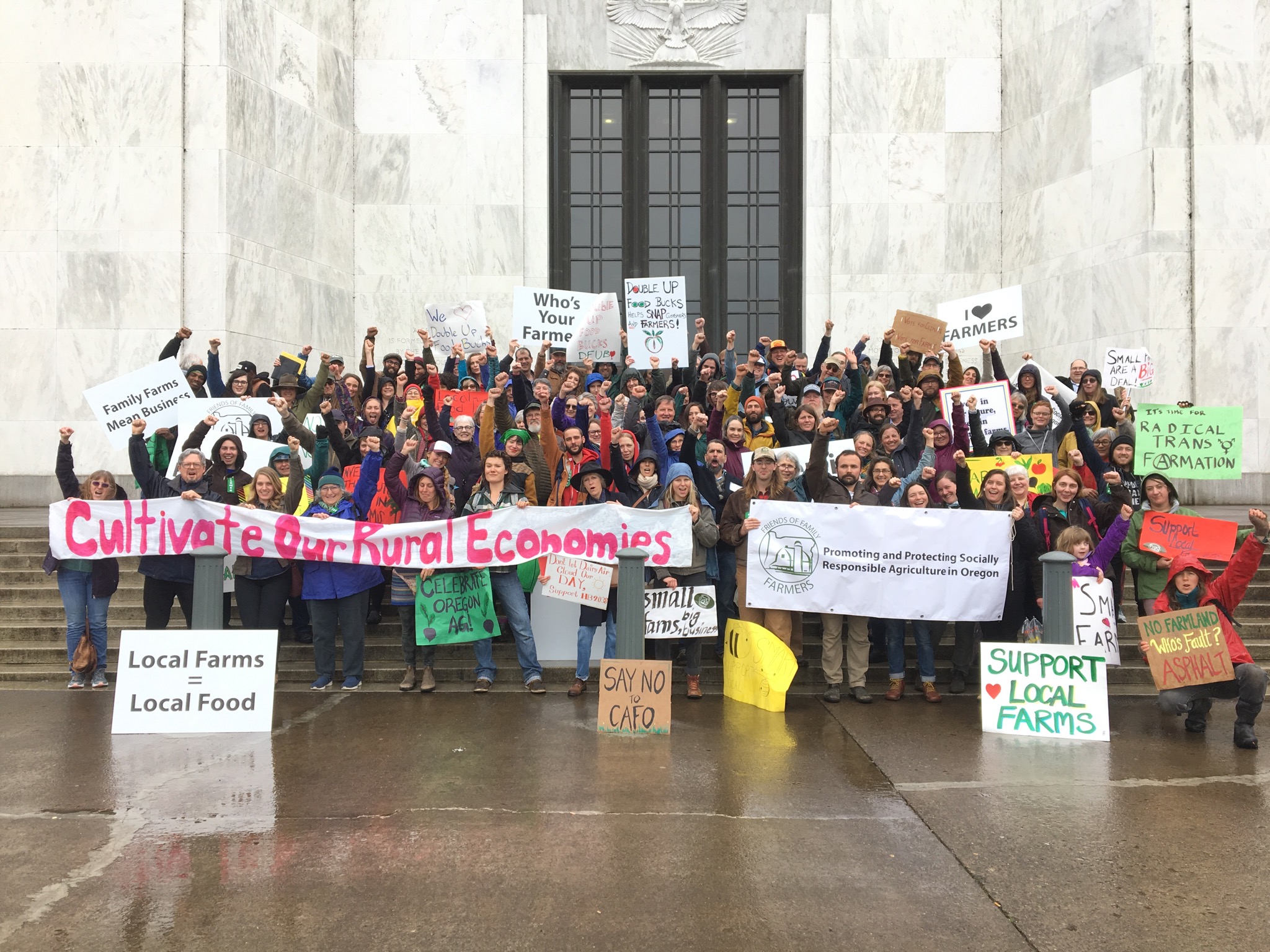Legislative Session Recap
To borrow words from a colleague in the Food Access Community, “I wasn’t at my best this session,” a sentiment that rang true for many. The challenges of conducting a virtual legislative session in the shadow of COVID-19, historic wildfires and ice storms, and other novel hurdles, were significant. Unfortunately, these cascading climate emergencies will only increase in severity and duration, increasing the need for resilient regional food systems with shorter supply chains that center small farms and the communities they feed. FoFF is pleased to report that significant strides were made towards this end, though more work remains.
And despite not being at our best, FoFF regularly testified at committee and informational hearings, critiqued agency budgets, submitted written testimony, met with legislators, supported coalition and grassroots organizing, and spoke with the media to advance our regenerative agriculture agenda. If there is specific testimony that you are interested in reading or watching, please reach out to our Policy Director at amy@friendsoffamilyfarmers.org or see the links in this blog post.
Big Wins
FoFF’s big win was getting our priority bill, HB2785, the grant fund to expand small scale meat processing, passed on the last day of session, June 26th. The grant fund was allotted $2 million, plus an additional $300K for OSU’s Clark Meat Science Center. While the initial (admittedly aspirational) ask was $10 million, this long-overdue investment should be considered a major milestone for small farmers and ranchers who have pushed for expanded processing for decades. FoFF hopes to participate in ODA’s rule-making around this grant fund and helped identify small processors that would like to participate in Oregon’s nascent State Meat Inspection Program. One FoFF farmer hopes to secure a grant to help fund the construction of an Animal Welfare Approved processing facility. FoFF, with your support, played a pivotal role in getting this legislation amended and across the finish line. However, the biggest thanks are reserved for Rep. Brock Smith and Rep. Owens, the Chief Sponsors of the bill, who made this win possible.
Another big victory is that FoFF blocked SB151, the continuation of the Bovine Manure Tax Credit through Jan. 1 2028. This tax credit has been awarded to facilities who use bovine manure in digesters to make “factory farm gas.” For large mega-dairies, this is a highly greenwashed process that maintains investment in fossil fuel infrastructure. The Legislative Fiscal Office estimated that the vast majority of the $15 million tax credit would have gone to Threemile Canyon Farms, which is owned by R.D. Offutt, the richest man in North Dakota. FoFF can think of better ways for Oregon to spend taxpayer dollars than enriching an out of state multi-millionaire, while also propping up factory farming systems that keep animals confined.
FoFF also assisted efforts that led to Double Up Food Bucks (DUFB) being funded at the $4 million level–a big jump from the initial $1.5 million funding level in 2019–which will improve access to fresh fruits and vegetables, many grown by FoFF farmers, for Oregonians participating in SNAP food assistance programs. Nearly one in four Oregonians experienced hunger during the pandemic and this program is a triple win for eaters, farmers, and the communities where these food dollars will create economic amplification.
FoFF advocated for a Soil Health Specialist at Oregon Department of Agriculture, which wasn’t originally included in the Governor’s Recommended Budget, and are happy to say that owing to OrCAN’s leadership and funding from NRCS, this position has been included in the agency’s budget.
Other Wins
Farm to School
Oregon’s successful Farm to School program continues to shine and was awarded $10.2 million. This maintains the current level of funding and the legislature has indicated that this level of funding is sustainable into the future.
Tax Fairness
The Leave No Worker Behind bill, HB 2819, which allows all income-eligible workers in Oregon to claim the state’s Earned Income Tax Credit (EITC). Currently, the EITC excludes certain workers, many deemed essential, across agriculture, food processing, retail, and construction sectors.
Racial Justice*
FoFF tracked the bills backed by the Environmental Justice Task Force, as one of the bills, SB 286, would have given agencies guidance on cumulative impacts when adopting rules, policies, or guidelines, especially in impacted communities and vulnerable populations, like those around mega-dairies in critical groundwater basins. Unfortunately, SB 286 didn’t pass. However, SB 289 did pass and will ensure equitable and safe access to Oregon’s public lands and parks in light of unfortunate racially-motivated harassment and attacks on people of color attempting to spend time in nature. (*Many other racial justice and police accountability bills were before the legislature, and many were successful, but giving a detailed debrief of this work is beyond the scope of FoFF’s legislative recap.)
Climate
As part of FoFF’s work (along with many coalition partners) around the Oregon Climate Action Plan, stemming from Executive Order 20-04, FoFF advocated for climate smart legislation and agency budget priorities throughout the session, and will continue agency and commission advocacy over the summer. Wins from the session include:
- HB 2021 100% Clean Energy for All transitions Oregon to 100% emissions-free electricity by 2040;
- HB2475 Oregon Energy Affordability Act authorizes the Public Utility Commission to consider differential energy burden and other inequities of affordability in rates;
- HB2842 Establishes a program within the Oregon Health Authority to provide grants to entities to provide financial assistance to low income households and landlords;
- SB762 Wildfire Safety Act;
- SB582 Recycling Modernization Act.
Land Use
HB2560 makes permanent the current COVID-related emergency/temporary requirements that all local governments provide a remote access option for local public hearings and meetings, which will ensure rural communities have improved access into the future.
More Work To Do
As a member of the Oregon Organic Coalition, FoFF advocated for the Oregon Organic Action Plan (SB 404), which, among many things, asked for five OSU Extension positions to aid research and assistance in organic production methods that would benefit organic and conventional farmers alike. Despite assurances by high-level decision makers in Salem that an allocation would be made in the end-of-session budget reconciliation bill, the coalition was disappointed to learn that nothing in the plan was funded. The coalition hoped to build on the momentum of the 2019 session, where $375K was awarded to OSU for two Extension Agents to specialize in organic vegetable production and organic forages and pastures. The coalition is already planning to pick up these efforts in the 2022 Short Session. If ever there was a time for investment in climate-adaptive production models, a record-shattering heat wave would be it.
A silver lining is that another Oregon Organic Action Plan ask was for $100K for Business Oregon to conduct a study of Oregon’s organic industry. While this specific request wasn’t filled, the legislature did make a $25,000,000 allocation to the Oregon Business Development Department for grants. The description of what is to be funded through the grants spells out the program priorities and the Coalition believes the organic assessment meets these requirements. We plan to write a grant to fund the provisions and further advance the Organic Action Plan.
FoFF and the Stand Up to Factory Farms Coalition once again advocated for a moratorium on new or expanded mega-dairies in light of on-going concerns about regulatory oversight and bad actors in the industry. Former House Agriculture and Natural Resources Chair Rep. Brad Witt refused to grant the House version a Public Hearing (HB2924) but after considerable grassroots pressure, Sen. Beyer scheduled a Public Hearing for the Senate version (SB583) on April 1, and this should be considered a win. Alice Morrison, FoFF’s Oregon Pasture Network Program Manager, testified on behalf of the legislation and did a fantastic job. Big thanks to our tireless Chief Sponsors, Rep. Nosse, Sen. Dembrow, and Sen. Golden, as well as new Regular Sponsors Sen. Gelser, Sen. Riley, Rep. Dexter, Rep. Hudson, Rep. Pham, and Rep. Reardon.
FoFF endorsed Ag Overtime efforts (SB 616 and HB 2358) as the underlying equity concepts of these bills are incredibly important to address in light of the racist roots at the center of why agriculture was originally exempted from overtime. FoFF understands this can be a tricky issue for some of our farmers, but we had many farmers reach out in support of these efforts. California and Washington have already passed similar legislation, but despite amendments that created a phase-in approach like Washington’s, and a $100 million employer transition fund, this bill was ultimately not prioritized by legislative leadership. Though in a post-session interview, Speaker Kotek mentioned that this is a priority in the next session.
SB16 was successful despite being marked a “Major Threat” by 1000 Friends of Oregon. This legislation will waive Oregon’s land use laws to allow up to 100 houses to be built on up to 200 acres of Exclusive Farm Use land in Eastern Oregon. Many are concerned this will create increased wildfire risks as well as new working lands encroachment precedent.
What’s Next
As of July 1, FoFF’s Policy Director is now working halftime but will still have a full plate with ongoing coalition work (Oregon Organic Coalition, Stand Up to Factory Farms, OCAP, and the Oregon Community Food Systems Network), agency and commission monitoring, federal advocacy and heat wave aid, a project with Organic Seed Alliance, Legislative Days, and of course, getting ready for the 2022 session. If you have policy issues that you’d like FoFF to address, please contact amy@friendsoffamilyfarmers.org.

